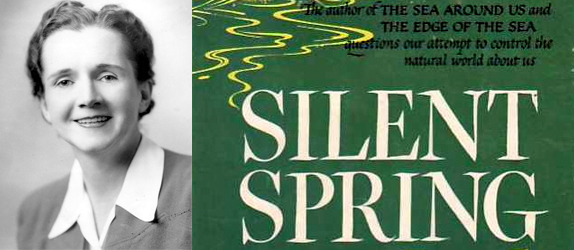
Well, we could argue over a couple of other non-fiction books, but Silent Spring is somewhere at the top.
The sedge is wither’d from the lake,
And no birds sing.
John Keats’ couplet starts this book of revelation by Rachel Carson, published in 1962; my 1994 edition has an introduction written by Vice President Al Gore. The VP says it’s a humbling experience to write about this book, because the book is undeniable proof that the power of an idea can be far greater than the power of politicians. Gore puts this book in perspective when he talks about the resistance that it met from the powerful polluters. He says Carson had two strengths: respect for the truth and a remarkable degree of personal courage.
This courage was evident in her personal struggles (Carson was undergoing radiation treatments while writing the book. Ironically, she died of breast cancer in 1964), “she was also writing against the grain of an orthodoxy rooted in the earliest days of the scientific revolution: that man…was properly the center and the master of all things, and that scientific history was primarily the story of his dominion”—there it is again, the crux of the issue: man’s dominion over nature.
The assaults on her were stunning.
“But Silent Spring could not be stifled.”
Gore gives the book its due. He states the author had planted the seeds of a new activism, the beginning of an environmental movement; and when she died it was becoming clear her voice would never be silenced. “She had awakened not only our nation but the world.”
Carson had certainly awakened the teenage Al Gore to environmentalism, more than anyone else. He confesses it was his mother who made him, and his sister read the book and discuss it—clearly, it moved him. And he understands its relevance in 1994. As he says, despite the banning of DDT here, “the environmental crisis has gotten worse, not better.” The rate of disaster has been slowed down. But since the publication of Silent Spring, pesticide use on farms has doubled to 1.1 billion tons yearly (remember, 1994). Production has increased 400 percent.
We have banned certain pesticides at home, but we still produce them today and export them to other countries, like Mexico and Peru. He mimics Carson when he says, “Poisoning the food chain anywhere ultimately poisons the food chain everywhere.”
Cancer rates have soared, as well as other diseases related to pesticides. Then he admits that it’s not that we have done nothing; “We have done some important things, but we have not done nearly enough.”
Since 1962 Congress has called for the establishment of review, registration, and information standards for pesticides—not once, but several times. When he came into office the standards for protecting farm workers were still not in place even though the EPA was established in 1970. They had been “working on them” since the early seventies.
He says Congress has protected the industry for a long time. Loose standards, difficulty in enforcing, economic benefits are weighed against toxicity. It takes 5 to 10 years to take a pesticide off the market.
The present system is a Faustian bargain—we get short-term gain at the expense of long-term tragedy.
“Essentially, what we have inherited is a system of laws and loopholes, deadlines and delays, facades that barely disguise a wholesale failure of policy.”
He outlines the problem: politics. Lobbyists. “Cleaning up politics is essential to cleaning up pollution.”
The EPA reported in 1988 that groundwater in 32 states was contaminated with 74 different agricultural chemicals, like the herbicide atrazine, which is classified as a potential carcinogen. Municipal water treatment does not remove it. In the Mississippi basin it runs off into the drinking water of 20 million people.
Atrazine continues to be a threat. In 2012 Syngenta corporation, manufacturer of atrazine, was the defendant in a class action lawsuit concerning the levels of atrazine in human water supplies. Syngenta agreed to pay $105 million to reimburse more than a thousand water systems for “the cost of filtering atrazine from drinking water,” although the company denied all wrongdoing.
Atrazine’s effects in humans and animals primarily involve the endocrine system. Studies suggest that atrazine is an endocrine disrupter that can cause hormone imbalance and birth defects.
The VP also talks about the past administration, James Watt and Ann Gorsuch at Interior and EPA, and how Clinton-Gore set new standards. He says Rachel Carson sat in on those meetings and though “We may not do everything she would want, all at once, but we are moving in the direction she indicated.”
In 1992 a panel of distinguished Americans selected Silent Spring as the most influential book of the last 50 years.
Gore thinks that consumer power will work against pesticide pollution, even when government does not. “The government must act, but the people can also decide—and I am convinced that the people will no longer let the government do nothing, or do the wrong thing.”
We have learned much in the fifty-two years since Silent Spring, but our representatives have dragged their feet, always fearful of angering the corporations who control their campaign coffers. This “Dollarocracy” we live in must be exposed and dismantled; not only is it undemocratic, but it betrays the true nature of a plutocracy, one that places profits over the health of the planet.

July 21, 2014